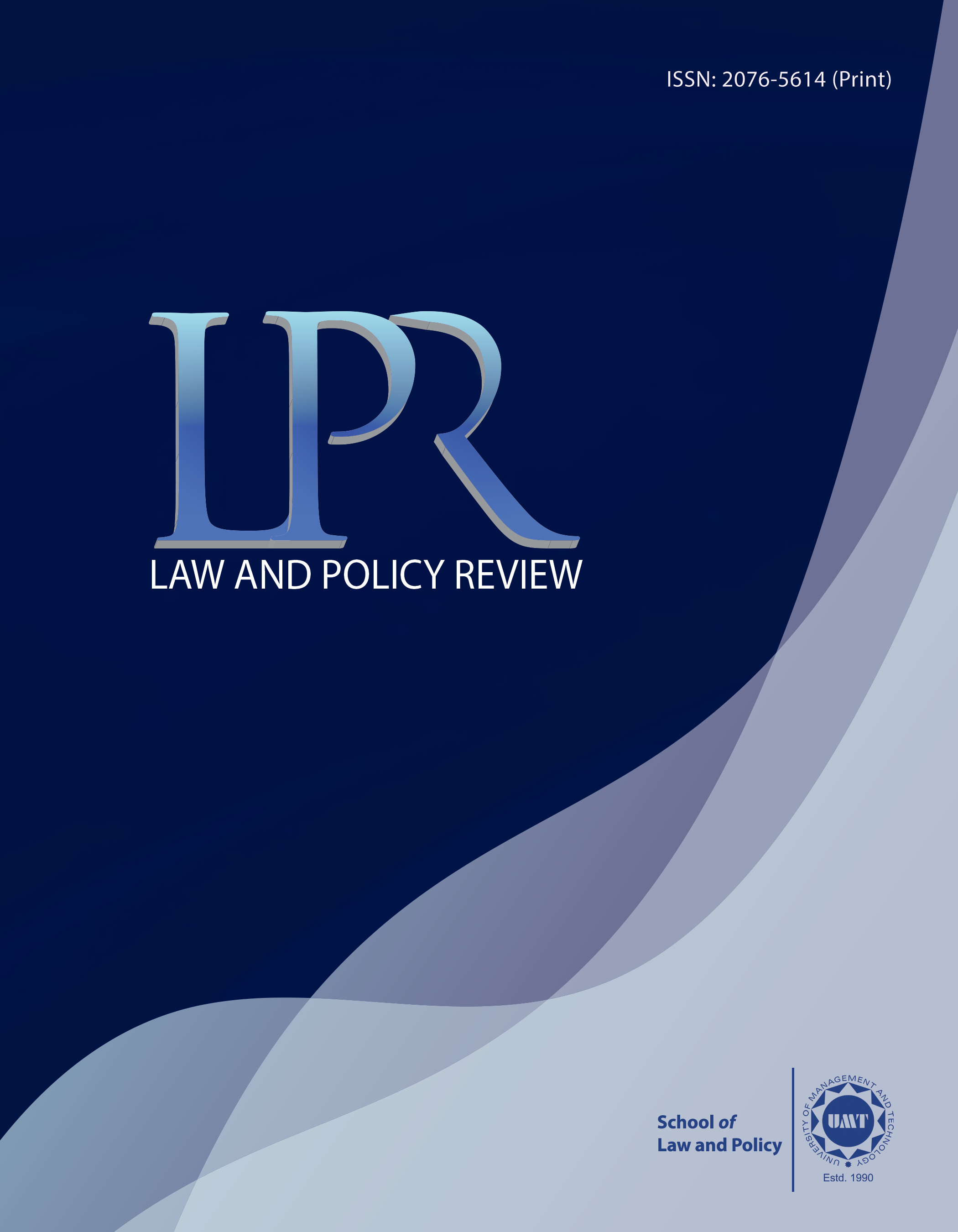Insanity Defense in Criminal Law in India: A Critical Analysis
Abstract
 Abstract Views: 0
Abstract Views: 0
Criminal law in India does not hold persons suffering from legal insanity as guilty of the crimes committed by them. The state of India adopted the concept of legal insanity and incorporated it in section 84 of the Indian Penal Code (IPC). An accused cannot be held liable for his offense if such an accused, at the time of the commission of an offense, was incapable of understanding the nature of the act and/or the concept of right and wrong. However, not every person who has a mental disorder would, ipso facto, be absolved of criminal liability. Instead, one must prove his legal insanity by the standard of evidence of the preponderance of probabilities. The burden of proof of insanity in an insanity plea is on the accused. Moreover, not every kind of medical insanity can be considered as legal insanity. There are certain criteria of legal insanity which an accused must meet to avail the defense of insanity. The scope of insanity defense under section 84 of IPC is limited only to the mental state of the accused at the time of the commission of an offense. Whereas, the mental state of the accused at the time of the trial and during incarceration is out of the scope of section 84 of the IPC, 1860. The opinion of the medical board in determining the legal insanity of the accused is sine qua non. This paper analyzes the law on insanity defense in India by adopting the doctrinal legal analysis approach. The findings have implications for lawyers, judges, jurists, psychiatrists, psychologists, and other stakeholders.
Downloads
References
Ajmal, A., & Rasool, F. (2022). Forensic evidence in criminal justice system in Pakistan. Global Legal Studies Review, 7(3), 25–31. https://doi.org/10.31703/glsr.2022(VII-III).04
Ajmal, A., & Rasool, F. (2023). Insanity defense in blasphemy offences in Pakistan. Global Social Sciences Review, 8(1), 447–453. https://doi.org/10.31703/gssr.2023(VIII-I).41
Ajmal, A., Nasim, B., & Rasool, F. (2022). Psychologists as expert witnesses in criminal matters in courts in Pakistan. Global Sociological Review, 7(4), 46–51. https://doi.org/10.31703/gsr.2022(VII-IV).06
Ajmal, A., Rasool, F., & Niazi, F. U. (2023). Evolution of modern insanity defense: A critical review. Annals of Human and Social Sciences, 4(4), 67–73. https://doi.org/10.35484/ahss.2023(4-IV)06
Anayat Ullah v. The State, P.Cr.L.J. 1114 (2022).
Arshad v. State of A.P., CrLJ 2893 (para34) (AP) (1995). https://indiankanoon.org/doc/648584/
Bapu Gajraj Singh v. State of Rajasthan, 8 SCC 66 (2007). https://indiankanoon.org/doc/673880/
Dahyabhai Chhaganbhai Thakker v. State of Gujarat, SCR (7) 361 (1964). https://indiankanoon.org/doc/1589322/
Elavarasan v. State RbIoP, (7) SCC 11 (2011). https://indiankanoon.org/doc/273583/
Gaur, K. D. (2009). Textbook on the Indian Penal Code. Universal Law Publishing.
Hari Singh Gond v. State of Madhya Pradesh, 16 SCC 109 (2008). https://indiankanoon.org/doc/1395565/
India Code. (2020). Indian Evidence Act, 1872. https://www. indiacode.nic.in/bitstream/123456789/15351/1/iea_1872.pdf
India Code. (2017). Indian Mental Healthcare Act, 2017. https://www. indiacode.nic.in/bitstream/123456789/2249/1/A2017-10.pdf
India Code. (1860). Indian Penal Code,1860. https://www.indiacode.nic.in/bitstream/123456789/4219/1/THE-INDIAN-PENAL-CODE-1860.pdf
Kumar, D., Viswanath, B., Sebestian, A., Holla, B., Konduru, R., Chandrashekar. C. R., & Math, S. B. (2014). Profile of male forensic psychiatric inpatients in South India. International Journal of Social Psychiatry, 60, 55–62. https://doi.org/10.1177/0020764012461334
Laxmikant S/O. Nagorao Kulkarni v. State of Mahrashtara, AIR 18 (Bom) (2018). https://indiankanoon.org/doc/4718488/
Mani Ram v. State of U.P. Supp (2) SCC 289,292; 1994 SCC (Cri) 1242 (1994). https://indiankanoon.org/doc/99850036/
Math, S. B., Murthy, P., Parthasarathy, R., Kumar, C. N., & Madhusudhan, S. (2011). Mental health and substance use problems in prisons: The Bangalore prison mental health study: Local lessons for national actions. National Institute of Mental Health and Neuro Sciences. http://www.antoniocasella.eu/archipsy/Bangalore_2011.pdf
Mt. Sukni Chamain v. Emperor, AIR 245 (Patna) (1936).
Muhammad Yaqoob v. The State, PCRLJ 2660 (1984).
Nambi, S., Siva, I., & Lakshmi, P. (2016). Forensic psychiatry in India: Past, present, and future. Indian Journal of Psychiatry, 58(Suppl 2), S175–S180. https://doi.org/10.4103/0019-5545.196827
Paneerselvam v. State Criminal Appeal (MD) No. 317 (2017). https://indiankanoon.org/doc/112295294/
Piara Singh v. State of Punjab AIR, SC 2274 (1977). https://indiankanoon.org/doc/1891900/
Ramedin v. State of MP Cr. L.J. 370 8(MP) (DB) (1996). https://indiankanoon.org/doc/1427319/
Ratan Lal v. State of Madhya Pradesh, (3) SCC 533 (1970). https://indiankanoon.org/doc/1915243/
S.Gopal Reddy v. State of A.P. AIR, SC 2184 (1996). https://indiankanoon.org/doc/1213429/
Sagar Dwarkanath Patil v. State of Maharashtra, 4 Crimes (HC) 432 (2018). https://supremetoday.ai/doc/judgement/00500029431
Santosh Maruti Mane v. State of Maharashtra, (1) ALD(Cri)(SC) 635 (2019). https://supremetoday.ai/doc/judgement/00100063570
Shatrughan Chauhan and another v. Union of India and others, 3 SCC1 (2014). https://indiankanoon.org/doc/59968841/
Sheralli Wali Mohammad v. State of Maharashtra, AIR 2443 (SC) (1972). https://indiankanoon.org/doc/1283052/
Shrikant Anandrao Bhosale v. State of Maharashtra (2002). https://indiankanoon.org/doc/1923024/
Siddhapal Kamala Yadav v. State of Maharashtra, AIR 97(SC) (2009). https://indiankanoon.org/doc/9767/
State of Rajasthan v. Shera Ram, SCMR 1768 (2012). https://indiankanoon.org/doc/624481245/
Sudhakaran v. State of Kerala, (10) SCC 582 (2010). https://indiankanoon.org/doc/358939/
Surendra Mishra v. State of Jharkhand, 11 SCC 495 (2011). https://indiankanoon.org/doc/1259566/
T. N. Lakshmaiah v. State of Karnataka, 1 SCC 219 (2002). https://indiankanoon.org/doc/517572/
The State v. Balahari Das Sutrandhar, PLD, Dacca 467 (1962).
X' v. State of Maharashtra, 7 SCC (2019). https://indiankanoon.org/doc/155869274/
Copyright (c) 2023 Ali Ajmal

This work is licensed under a Creative Commons Attribution 4.0 International License.
LPR follow an open-access publishing policy and full text of all published articles is available free, immediately upon publication of an issue. The journal’s contents are published and distributed under the terms of the Creative Commons Attribution 4.0 International (CC-BY 4.0) license. Thus, the work submitted to the journal implies that it is original, unpublished work of the authors (neither published previously nor accepted/under consideration for publication elsewhere). On acceptance of a manuscript for publication, a corresponding author on the behalf of all co-authors of the manuscript will sign and submit a completed the Copyright and Author Consent Form.





